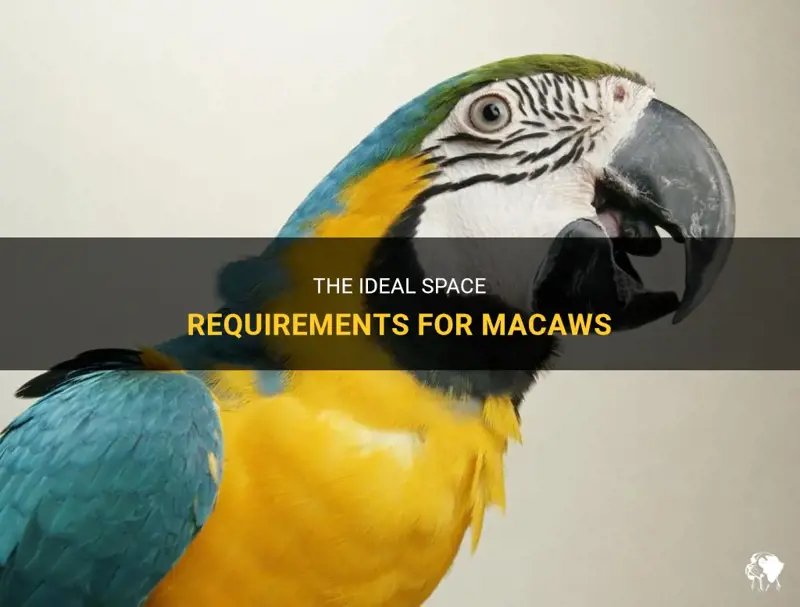
You might be surprised to learn that macaws can easily live for 50 years or more, making them a long-term commitment. This isn’t just about a big cage or a large room; it’s a combination of factors that contribute to their happiness and health. So, how do you measure that space? Let’s break it down with practical tips and guidelines that anyone considering a macaw should know.
Understanding Macaw Behavior
Before we get into the specifics of space, it helps to understand how macaws act. These birds are naturally social, often found in large flocks in the wild. They are curious and love to explore. Because of their playful nature, they need more than just a place to sit; they require an environment that stimulates their minds and bodies.
Imagine being locked in a room for hours on end—pretty boring, right? That’s how a macaw feels if they don’t have enough room to move around, climb, and interact with toys. They need space for their natural behaviors like flying, climbing, and playing. Without proper space, they can develop anxiety and bad habits, like excessive screeching or feather plucking.
Additionally, macaws are known for being quite intelligent. They benefit from having details in their environment, such as different levels to perch on and a variety of toys to engage with. A larger living space allows for these enriching activities, making it vital for their overall happiness.
The Minimum Cage Size for Macaws
When deciding on living space for your macaw, cage size is one of the most important factors. For most macaw species, the minimum recommended cage size is 36 inches wide, 24 inches deep, and 48 inches tall. However, bigger is always better. If you can manage it, aim for a cage that’s 48 inches wide and 36 inches deep, or even larger.
Why the extra space? Macaws are magnificent fliers. They need enough room to stretch their wings and flap around. A cramped cage not only limits their movement but can also lead to physical issues, such as obesity or joint problems. Go for a cage that allows them to move freely and comfortably, as this promotes their health and happiness.
Keep in mind that the cage should have horizontal and vertical bars for climbing—macaws love to perch high. Moreover, ensure the bars are spaced appropriately (1-1.5 inches apart) to keep them safe.
Room for Playtime and Exercise
While a cage is important, it’s just one part of the puzzle. Macaws need plenty of free space to exercise outside their cage. Creating a designated play area in your home can be a game-changer. This space should be safe and free from hazards like electrical cords or toxic plants.
You might be wondering how much space is enough for this play area. A space that’s at least 4 by 6 feet is an excellent starting point. Make sure to include various perches at different heights and a few safe toys to keep them entertained. This not only encourages physical activity but also stimulates their minds.
Interacting with your macaw outside their cage is equally important. Set aside time each day for supervised playtime. This could involve letting them fly in a safe room or spending time on a large play gym. The more space you provide for movement, the happier your feathered friend will be.
Why Space Affects Behavior and Health
You might be surprised to learn that space isn’t just about comfort; it directly impacts a macaw’s behavior and health. A cramped or boring environment can lead to stress, which can manifest in various behavioral issues.
For example, a stressed macaw might engage in destructive behaviors like chewing on furniture or plucking its feathers. This is their way of coping with confinement. On the other hand, when they have room to explore and play, you’ll see a noticeable difference in their demeanor. They’ll be more relaxed, sociable, and even more vocal.
In addition, giving them enough space to fly helps maintain their physical health. Regular exercise is crucial for preventing obesity and other health problems. Think of it like this: Just as humans need room to move and stay active, macaws thrive in environments that allow for natural behaviors.
Macaws and Surrounding Environment
While the cage and play area are essential, the surrounding environment also matters. The noise level, temperature, and potential hazards in your home can influence how much space a macaw actually needs.
Macaws are sensitive to loud noises and sudden changes. A quiet, calm environment allows them to feel secure, encouraging them to explore their space without stress. This is especially important if you have other pets or children. If there’s too much commotion, it might be wise to designate a quieter area in your home for their playtime.
Temperature is another factor. Macaws are tropical birds and prefer warmer environments. A room that maintains a stable temperature is ideal. Avoid placing their cage near drafts, heaters, or air conditioning vents to ensure they stay comfortable.
Common Misconceptions About Macaw Space Requirements
There are quite a few myths floating around about how much space a macaw needs. One common belief is that a smaller cage is acceptable as long as you let them out for exercise regularly. While it’s true that out-of-cage time is vital, it cannot replace the need for a spacious living area.
Another misconception is that all macaws need the same amount of space. In reality, different species have different requirements. For instance, Hyacinth macaws, the largest of the macaw species, need more room than smaller ones like the Green-winged macaw. Understanding these differences can help you provide the best environment for your specific bird.
Lastly, some people think that macaws can adapt to any living situation. While they’re resilient birds, they won’t thrive in cramped environments, no matter how much time you spend with them. Prioritizing their space needs is vital for their long-term happiness.
In summary, giving your macaw enough space is crucial. Think of their environment like a canvas for a vibrant painting—you want to give them the best backdrop for their flourishing personality. From a properly sized cage to ample play areas, macaws need room to move, play, and express their natural behaviors.
By understanding their space requirements and creating an enriched environment, you’re setting your feathered friend up for success. Investing in their space isn’t just about compliance with recommendations; it’s about enhancing their quality of life. So, if you’re welcoming a macaw into your home, remember: space is not just an afterthought—it’s a cornerstone of their health and happiness.

